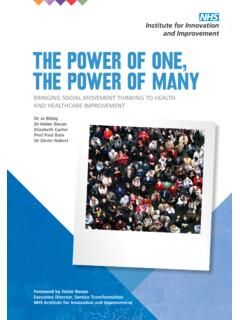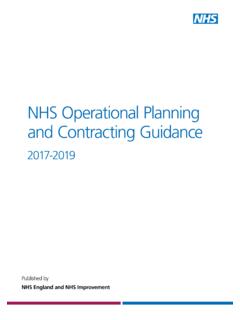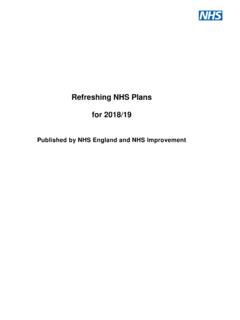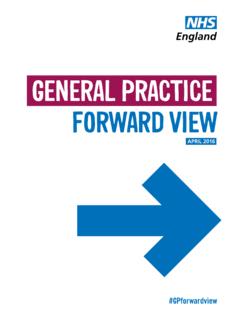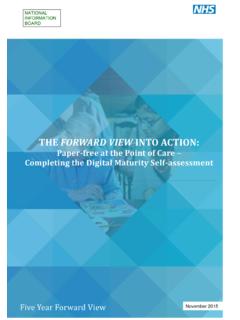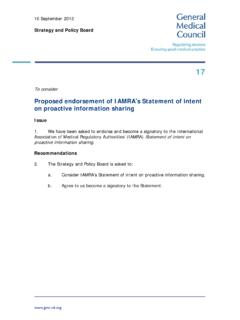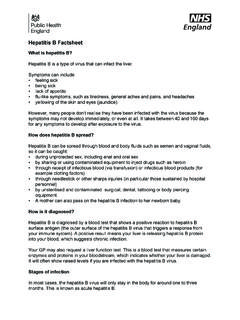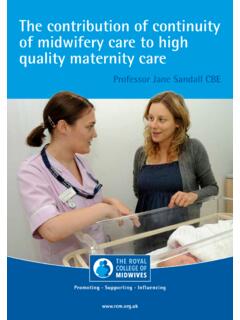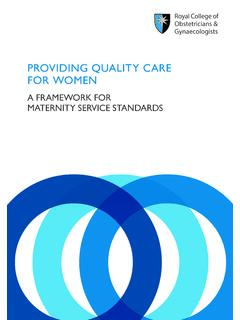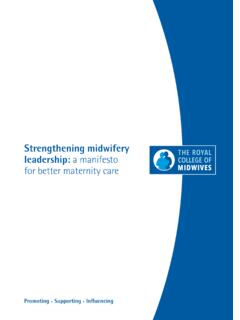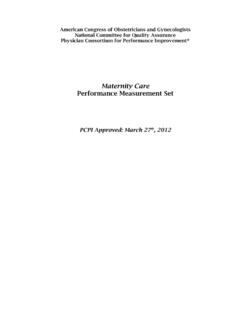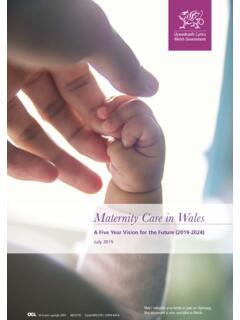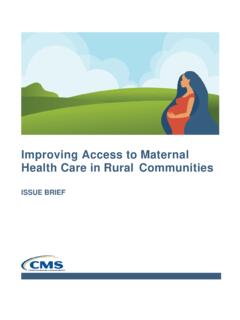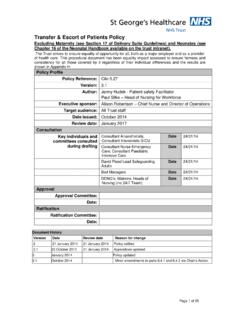Transcription of Implementing the Recommendations of the Neonatal …
1 NHS England and NHS Improvement Implementing the Recommendations of the Neonatal Critical care Transformation Review 2 Contents Introduction .. 3 Our vision .. 5 How Neonatal care is organised .. 6 The Action Plan .. 9 Aligning capacity .. 9 Action 1: Review and invest in Neonatal capacity .. 9 Action 2: Develop transport pathways .. 11 Staffing .. 12 Developing the expert Neonatal workforce .. 12 Action 3: Develop the Neonatal nursing workforce .. 13 Action 4: Optimise medical staffing .. 14 Action 5: Develop strategies for the allied health professions .. 16 Support for Parents .. 17 Enhancing the experience of families .. 17 Action 6: Develop and invest in support for parents .. 17 Making it happen .. 20 Action 7: Develop local implementation plans .. 20 Action 8: Ensure Neonatal services are integrated into maternity planning .. 23 Action 9: Establish a national infrastructure to oversee implementation of the actions in this plan.
2 25 Action 10: Establish national reporting of regional Neonatal outcomes .. 26 Appendix: The Case for Change .. 28 Outcomes .. 28 Activity, demand and capacity .. 30 Neonatal transfers .. 33 Staffing .. 34 Pricing .. 37 Glossary .. 38 Publishing Approval Reference 001354 3 Introduction Over the last 25 years the prospects for babies who are born very premature, have congenital anomalies requiring surgery, or who develop illnesses after birth, have improved greatly (Figure 1). We have seen many clinical improvements in care such as the introduction of treatments for lung disease and a recognition of the importance of parents in playing an active role, alongside health care professionals, in the provision of Neonatal care . Alongside this, services have been re-organised into a series of networks so that hospitals can work together to ensure that expert care can be delivered when it is needed. In particular, getting early care right means that many more babies grow up within their family with a full range of life chances than was the case before.
3 For example, in babies born at extremely low gestational ages (23-25 weeks of gestation) survival increased between 1995 and 2006 by 15%,1 and since then has continued to improve year on Improving outcomes should not mean we are complacent. The evidence shows that there are further gains that can and should be achieved. We know that some of the variation in outcomes is due to babies being born in maternity units without intensive care services. However, there is also unexplained variation in a range of important Neonatal conditions. One such example is the significant chronic lung disorder called bronchopulmonary dysplasia (Figure 2). If we can reduce these 1 Moore et al BMJ 2012 2 Santhakumaran et al ADC F&N 2017 Figure 1: Infant mortality in England and Wales between 1921 and 2016 (source: Office for National Statistics) Figure 2: Variation in proportion of babies born at 30 weeks gestation or less who survive with bronchopulmonary dysplasia by operational delivery network (source National Neonatal Audit Report 2017) 4 dif ferences, outcomes will improve further and put us on track to achieve our goal in the NHS Long Term Plan to halve Neonatal deaths by 2025.
4 In February 2016 Better Births set out the Five Year Forward View for NHS maternity services in England. This report highlighted several challenges facing Neonatal medical and nurse staffing, nurse training, the provision of support staff and cot capacity. It recommended a dedicated review of Neonatal services. In response NHS England commissioned the Neonatal Critical care Review (NCCR). Phase one of the NCCR comprised an evidence review undertaken by the NHS England Neonatal Critical care Clinical Reference Group (CRG) across several work streams. Phase two of the NCCR focuses on turning the evidence review into a specific action plan for Regional Commissioning Teams, Neonatal Operational Delivery Networks (ODNs) and Local maternity Systems (LMSs) to inform commissioner plans and, where required, service change. This report sets out the actions required to inform commissioner planning, which are directly linked to the case for change (appendix).
5 For each action it sets out: the evidence that underpins the action; the actions that should be taken and who should complete them; timetable; the support that is available. The NHS Long Term Plan has committed to new investment over the next 5 years to meet the action plan. Its three key commitments are focused on: 1. Developing Neonatal capacity: redesigning and expanding Neonatal critical care services to further enhance safety, effectiveness and the experience of families, to improve Neonatal capacity and triage within expert maternity and Neonatal centres. 2. Further developing the expert Neonatal workforce required: extra Neonatal nurses and expanded roles for some allied health professionals to support clinical care . 3. Enhancing the experience of families through care coordinators and investment in improved parental accommodation. The action plan is aligned with these commitments and the Making it happen section sets out how to ensure delivery of the actions contained in the plan, and how to track outcomes.
6 To support this, links are provided throughout to sources of further information. NHS England s directly commissioned services include Neonatal Critical care Services. Specialised Commissioning Teams work across regional and national footprints to support the commissioning and delivery of specialised services and the implementation of national policies. 5 The action plan is intended to support regional and local systems to take ownership of the issues raised, rather than setting a detailed national blueprint. It will inform and support the development of commissioner planning that will be subject to NHS service change and assurance processes; including where appropriate, public and patient engagement and consultation. Further information Our vision Neonatal critical care forms a key element of the NHS maternity service, providing part of the service available for all women and their new-born babies in the birthing room and during the early postnatal period.
7 Neonatal critical care also provides an emergency service and ongoing support for babies and their families when a baby is born very prematurely, becomes sick or develops a medical problem. Involving the family and providing support and advice to them is integral to the delivery of high quality , personalised, Neonatal critical care . This enables the family to become part of the team looking after their new baby, minimises separation, promotes attachment, helps families to understand their baby s needs and to develop confidence in caring for their baby. Neonatal services are inextricably interdependent with maternity services and are a key part of the maternity Transformation Programme, established to implement Better Births. Together, the maternity Transformation Programme and the NCCR form a coherent programme to improve outcomes for women and babies using maternity and Neonatal services, including actions to improve pre-conception, antenatal, intrapartum and postnatal care , all of which have an impact on Neonatal outcomes.
8 Ensuring that implementation of both Neonatal and maternity transformation plans remain coordinated and proceed together is an important part of national, regional and local planning. However, this report focuses specifically on Neonatal services and the interface with maternity services. The vision for Neonatal services across England A seamless, responsive and multidisciplinary service built around the needs of new-born babies and the involvement of families in their care . high quality Neonatal care will be networked together across England, to improve outcomes for all families, provide safe expert care as close to their home as possible, and keep mother and baby together while they need care . 6 The delivery of this vision is dependent on a highly skilled, multidisciplinary and expert workforce, working in a network of teams, each contributing different expertise in supporting the baby and their family in a way that is appropriate to their needs.
9 In some circumstances, babies with particular clinical needs will require transfer of care from the local team to a Neonatal Intensive care Unit elsewhere in the network, so appropriate expert care can be provided. How Neonatal care is organised Over the past 20 years Neonatal services have been organised into networks of providers that work together to deliver care . Neonatal care pathways involve highly specialist care being available in local Neonatal Intensive care Units (NICUs) in each area to minimise necessary travel for parents and their child. Ten Neonatal ODNs are commissioned by NHS England s Specialised Commissioning team. These have a mandate to develop and implement programmes of work to improve access to specialist resources, and to improve Neonatal outcomes and patient experience, working closely with both providers and commissioners. maternity and Neonatal care are inextricably linked and work together to produce the best outcomes for women and their babies who need specialised care .
10 Neonatal ODNs work closely with LMSs to ensure that high quality care is provided that is responsive to the needs of women and their babies and maintains care as close to their home as is possible. There are three types of Neonatal unit, as described below, and three types of care Some NHS Trusts host more than one Neonatal unit. Neonatal care is currently delivered in 161 Neonatal Units across England: 44 Neonatal Intensive care Unit s (18 of which also support a co-located Neonatal surgical service). 77 Local Neonatal Units. 35 Special care Units. The units deliver 3 types of care (special care , high dependency and intensive care ). Neonatal Intensive care Units (NICU) provide care for the whole range of Neonatal care . They are staffed to care for the sickest and most immature babies and staff work closely with their local maternity teams and fetal medicine services. The NHS England Neonatal Critical care service specification [E08/S/a] indicates that all women and their babies who are born <27 weeks of gestation or birthweight <800g, and multiple pregnancies <28 weeks of gestation, should receive perinatal and early Neonatal care in a maternity service with a NICU facility.
